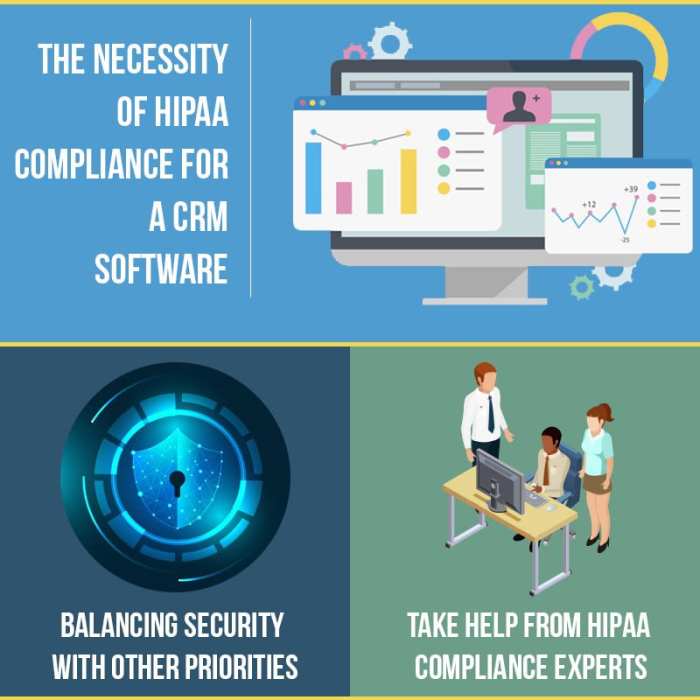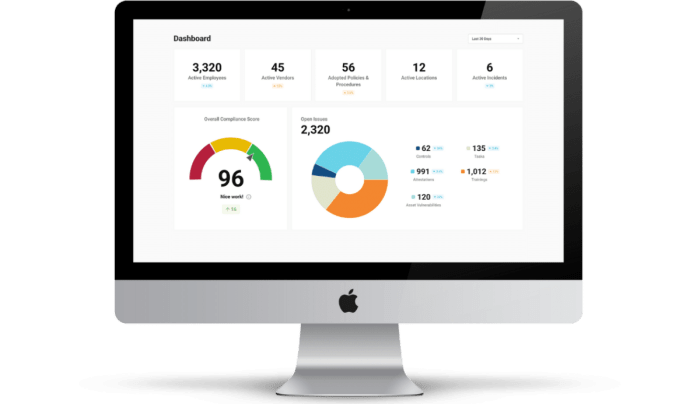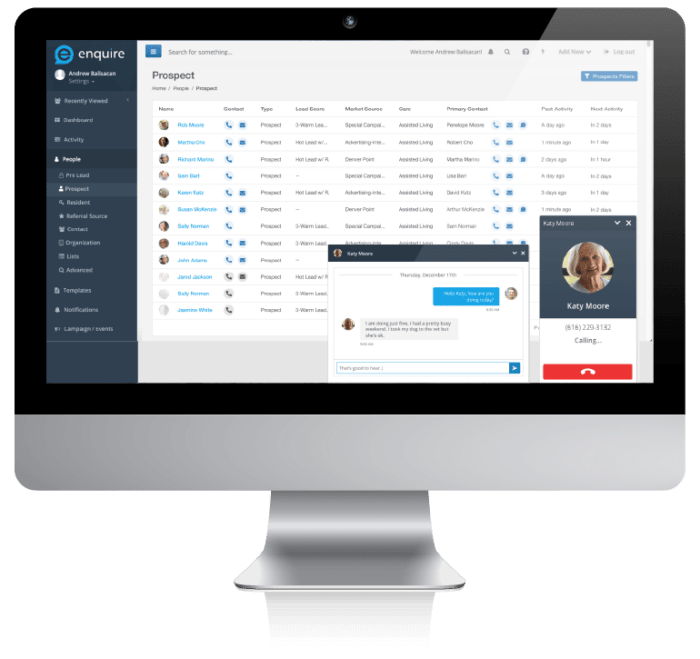Crm software hipaa compliant – In today’s healthcare landscape, protecting sensitive patient data is paramount. The Health Insurance Portability and Accountability Act of 1996 (HIPAA) sets stringent regulations for the handling of Protected Health Information (PHI). For healthcare providers and organizations, choosing the right Customer Relationship Management (CRM) software is crucial, and ensuring HIPAA compliance is non-negotiable. This comprehensive guide explores the intricacies of HIPAA-compliant CRM software, helping you navigate the complexities and make informed decisions.

Source: crmsolutionsusa.com
Understanding HIPAA Compliance and CRM Software: Crm Software Hipaa Compliant
Before diving into the specifics of HIPAA-compliant CRM software, it’s vital to understand the core principles of HIPAA. The act mandates the protection of PHI, encompassing any individually identifiable health information. This includes names, addresses, medical records, insurance information, and more. A violation can lead to severe penalties, including hefty fines and legal repercussions. A CRM system, by its nature, stores and manages patient data, making HIPAA compliance a critical factor in its selection and implementation.
Key HIPAA Requirements for CRM Systems
- Data Encryption: All PHI stored and transmitted within the CRM must be encrypted both at rest and in transit. This safeguards data from unauthorized access even if a breach occurs.
- Access Control: The system must have robust access controls, limiting access to PHI based on the principle of least privilege. Only authorized personnel should have access to specific patient data.
- Audit Trails: A comprehensive audit trail is essential to track all access and modifications to PHI. This allows for accountability and helps in identifying potential security breaches.
- Data Backup and Recovery: Regular data backups and a robust recovery plan are critical to ensure data availability in case of system failures or disasters. This safeguards against data loss and maintains business continuity.
- Business Associate Agreements (BAAs): If using a third-party CRM provider, a Business Associate Agreement (BAA) is mandatory. This legally binding contract Artikels the provider’s responsibilities in protecting PHI.
- Employee Training: Employees who access and handle PHI within the CRM must receive comprehensive HIPAA training to understand their responsibilities and the implications of non-compliance.
- Security Risk Analysis: Regular security risk assessments are crucial to identify potential vulnerabilities and implement appropriate safeguards. This proactive approach minimizes the risk of breaches.
Choosing a HIPAA Compliant CRM: Key Considerations
Selecting a HIPAA-compliant CRM requires careful evaluation of several factors. Don’t just rely on marketing claims; thoroughly investigate the vendor’s security practices and compliance certifications.

Source: compliancy-group.com
Essential Features to Look For, Crm software hipaa compliant
- Built-in Security Features: The CRM should have inherent security features like data encryption, access controls, and audit trails, not just add-ons.
- BAA Availability: Ensure the vendor readily provides a BAA. Review the terms carefully before signing.
- Compliance Certifications: Look for certifications like SOC 2 Type II, ISO 27001, or HITRUST CSF, which demonstrate a commitment to security and compliance.
- Data Location and Hosting: Understand where the data is stored and hosted. Consider the jurisdiction and data privacy regulations of that location.
- Scalability and Flexibility: Choose a system that can adapt to your organization’s evolving needs, accommodating growth and changes in data volume.
- Integration Capabilities: The CRM should seamlessly integrate with other healthcare systems, such as Electronic Health Records (EHR) systems, to ensure efficient data flow.
- User-Friendliness: The system should be intuitive and easy to use for all staff members, regardless of their technical expertise.
- Customer Support: Reliable customer support is essential to address any technical issues or compliance questions promptly.
Popular HIPAA Compliant CRM Software Options
(Note: This section is not an endorsement, and the availability and features of specific software can change. Always conduct your own thorough research before selecting a vendor.)
Several CRM vendors offer solutions designed with HIPAA compliance in mind. Some examples include (but are not limited to) Salesforce Health Cloud, HubSpot (with appropriate configurations and add-ons), and specialized healthcare CRM platforms. It’s crucial to verify their compliance certifications and BAA availability before making a decision.
Maintaining HIPAA Compliance with Your CRM
Selecting a compliant CRM is just the first step. Ongoing vigilance and adherence to best practices are essential for maintaining compliance.
Ongoing Compliance Measures
- Regular Security Audits: Conduct regular internal and external security audits to identify vulnerabilities and ensure the system remains secure.
- Employee Training: Provide ongoing HIPAA training to employees to reinforce their understanding of compliance requirements and best practices.
- Incident Response Plan: Develop and regularly test a comprehensive incident response plan to handle potential security breaches or data loss effectively.
- Software Updates: Keep the CRM software and its components up-to-date with the latest security patches and updates to address vulnerabilities promptly.
- Vendor Management: Maintain close communication with your CRM vendor to stay informed about security updates, compliance changes, and any potential issues.
Frequently Asked Questions (FAQ)
- Q: What is PHI? A: PHI stands for Protected Health Information and includes any individually identifiable health information.
- Q: What is a BAA? A: A Business Associate Agreement is a contract between a covered entity and a business associate that Artikels the responsibilities for protecting PHI.
- Q: What are the penalties for HIPAA violations? A: Penalties for HIPAA violations can range from significant fines to criminal charges, depending on the severity of the violation.
- Q: Can I use a standard CRM and make it HIPAA compliant? A: While some standard CRMs can be
-configured* for HIPAA compliance, it’s often more complex and may not offer the same level of built-in security as a dedicated HIPAA-compliant solution. It’s generally recommended to use a system specifically designed for HIPAA compliance. - Q: How often should I review my HIPAA compliance measures? A: Regular reviews, at least annually, are recommended to ensure your practices remain aligned with evolving regulations and best practices.
Call to Action
Protecting patient data is not just a legal requirement; it’s an ethical imperative. Choosing the right HIPAA-compliant CRM software is a crucial step in ensuring the privacy and security of sensitive health information. Take the time to research your options carefully, understand the compliance requirements, and implement robust security measures. Don’t hesitate to consult with healthcare IT professionals or legal counsel to ensure your organization is fully compliant.
Resources:
- U.S. Department of Health & Human Services (HHS) HIPAA Website
- National Institute of Standards and Technology (NIST)
- (Add other relevant links here)
FAQs
What are the penalties for HIPAA non-compliance?

Source: jotform.com
Penalties for HIPAA violations can range from relatively small fines to significant financial penalties and even criminal charges, depending on the severity and nature of the violation.
Can I use a standard CRM and just add security measures?
While adding security measures to a standard CRM might seem cost-effective, it’s generally not sufficient to achieve true HIPAA compliance. A purpose-built HIPAA-compliant CRM offers comprehensive features designed from the ground up to meet the regulations.
How do I verify a CRM’s HIPAA compliance?
Look for certifications, independent audits, and documented compliance programs from the vendor. Review their Business Associate Agreements (BAAs) carefully.
What is a Business Associate Agreement (BAA)?
A BAA is a contract between a covered entity (healthcare provider) and a business associate (CRM vendor) that Artikels the responsibilities of each party in protecting PHI.
